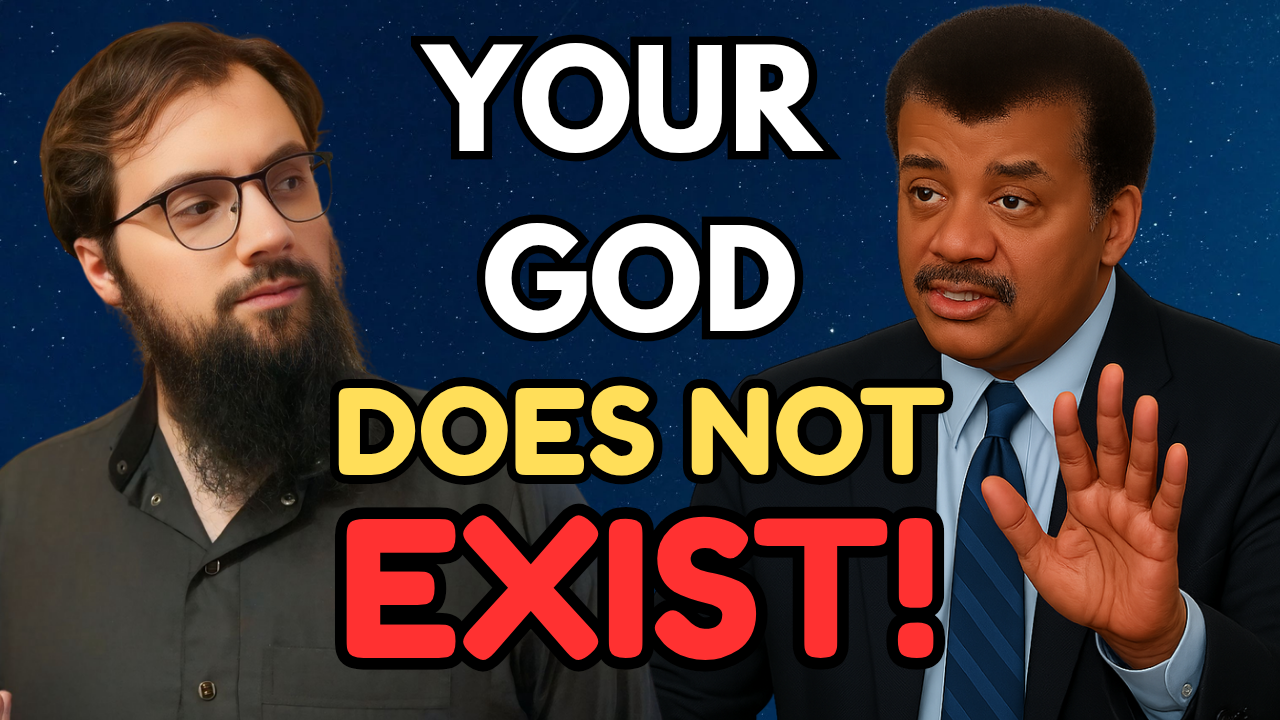Neil deGrasse Tyson Debunked on Religion and God

Astrophysicist Neil deGrasee Tyson has been popping up a lot on youtube recently. Many atheists are posting videos of him apparently ‘destroying’ religion or ‘debunking God.’ Well in this article I will be taking a look at some of the arguments presented by Tyson in those videos and showing why those arguments are not as intelligent as many online atheists make them out to be.
“No Evidence for God”
Many times Tyson and other atheists will claim that one of the main reasons why they do not believe in a God is because there is simply no evidence of God’s existence. If there were evidence, then obviously Tyson and these other atheists would believe in a God.
To understand why this is blatently wrong, we need to first understand what ‘evidence’ means. In the field of epistemology (the field of philosophy on how we acquire knowledge), evidence simply means anything that increases the likelihood of the believability of a thing. For instance, hearing your front-door open and then close and that accompanied by footsteps is good evidence that someone entered your house. Now whether that is the case or not is besides the point. The point being made here is that this event could be used as evidence for the conclusion that someone entered your house.
With this understanding of evidence, what constitutes as evidence is very broad. Most philosophers will agree that arguments (especially deductive arguments) are considered as evidence. Take the classic deductive argument:
- All men are mortal
- Socrates is a man
- Therefore, Socrates is mortal
These two premises presented, that all men are mortal and socrates is a man, are evidences to support the conclusion that Socrates is mortal.
Understanding all of this, it is clear that not only is there evidence for God’s existence, but there are A LOT of evidences for God’s existence. Arguments like the Kalam cosmological argument, the ontological argument, contingency argument, fine-tuning argument, the consciousness argument etc. These are not hidden arguments that only elite theists in Cambridge know about; these are the most famous and most discussed arguments about the existence of God. And as shown previously arguments are considered evidences. Therefore, there IS evidence for God. Not only that, there are a LOT of evidence for God and a lot of GOOD evidence for Him as well.
However, it seems that when Tyson says “no evidence,” what he really means is “no scientific evidence.” Tyson is demanding something empirical, something physical and observable for God. This reveals an underlying assumption: that evidence must be scientific in nature.
If what Tyson means by no evidence is that there is no scientific evidence, then Tyson is falling into a philosophical position known as scientism. Scienitism is a philosophical belief that science is the only path of truth. However, this belief is simply self-defeating and illogical. There are many things that we all believe in that have no scientific evidence to prove that those things exist.
Take the law of non-contradiction: a statement cannot be both true and false at the same time in the same way. If I tell you I saw a three-sided square or that Obama is the president in 2025, you’d rightly reject those statements without needing to conduct scientific research — because they’re contradictions.
Science assumes the law of non-contradiction, but it cannot prove it scientifically. There’s no peer-reviewed paper that empirically proves contradictions can’t exist. It’s just a self-evident principle. Yet, if we adopt Tyson’s scientistic standard — that only scientific evidence counts — we’d have to throw out logic itself.
This is why Tyson’s position on “evidence” is not only philosophically shallow, but ultimately self-defeating.
”Which God are you talking about?”
In a YouTube video titled “Neil deGrasse Tyson on Why He Doesn’t Believe in God: Which God? There’s 18,000 Gods!”, Tyson argues that before even discussing whether God exists, one must first specify which God — out of the thousands humanity has believed in.
This is a popular atheist talking point, but frankly, it’s a bad argument. When theists present arguments for God, they’re typically not arguing for a specific deity at the outset. They’re arguing for the existence of a necessary, eternal, intelligent cause of the universe — what most people broadly refer to as “God.”
To make this clearer, imagine the police say a serial killer is on the loose. Someone in the crowd then objects: “Well, who is the killer?” The police respond, “We don’t know yet — we just know someone is responsible for a string of murders.” Now imagine the person saying, “Well, if you can’t tell me exactly who it is, then I don’t believe there’s a killer.” That’s absurd.
In the same way, it’s perfectly rational to argue for the existence of a creator without immediately identifying which specific deity that creator is.
Most arguments for a God work in stages. The first stage is to establish that a necessary being, first cause, or designer exists. If the atheist can admit that there needs to be a necessary being or a first cause to the universe, only then do many theists go to the second stage which is discussing why that necessary being or first cause is God. If the atheist can see why that necessary being is God, then and only then do theists point to a specific God. Tyson’s ‘which God’ remark is only relevant to the third stage and not the first two.
Lastly, this 18,000 God remark is a bit misleading. When looking at the conceptions of God, we see that there are really 2 types of god to consider: a polytheistic type of gods (multiple gods) or monotheistic. Polytheism has many problems. There cannot be two necessary beings. There cannot be two first causes to the universe. Many people agree that polytheism has many contradictions.
So if we eliminate polytheism due to the contradictions polytheism has, then we really have eliminated 97% of the 18,000 gods. That only leaves us with monotheistic conceptions of God, which are really only a handful to consider.
Anyway that you look at it, Tyson’s ‘which god’ and ‘18,000 gods’ remarks are really weak arguments.
”God of the gaps”
In another clip, Tyson critiques the so-called “God of the gaps” argument — the idea that when something is unexplained, people invoke God as the explanation. The example that Tyson provides in the clip is back in the day, ancient people used to claim that lightning came from God. However, modern science has shown that lightning in fact is simply a force of nature and does not need an outside force (God) to cause lightning.
What Tyson is trying to say here is that throughout history theists have utilized elements of nature that had no explanation, claimed that because that element of nature is unexplained God must have done it, only for scientists to come years later and explain that unexplained element. Essentially, there seems to be a track record of theists who claim God did X (like lightning) only for there to be a naturalistic reasons for X occurring.
This objection sounds compelling — until you realize that it completely misrepresents theistic arguments.
Most serious theists aren’t pointing to gaps in knowledge and stuffing “God” into them. They’re pointing to things that cannot be explained by naturalistic science at all — such as consciousness, moral truths, the existence of abstract entities like numbers or logic, or the very existence of something rather than nothing. Some of these questions (maybe even all) seem to have no natural explanation for them.
Take consciousness for example. We are made up of material non-sense parts. Flesh, blood, bones, atoms and particles all do not have the ability to sense pain, pleasure, and so on. Yet, even though we are made up of these non-sense parts, we humans are able to sense. We have the ability to feel happiness, to feel sad, to express ourselves in different ways and so on.
This is generally called the hard problem of consciouness. David Chalmers himself, an atheist academic who wrote this problem, explains that taking a strict materialistic or naturalist stance cannot account for how we have consciouness. There needs to be something non-material or non-natural to account for how we are able to have sense ability.
In cases like the hard problem of consciouness theists are not falling into the ‘god of the gaps’ problem. Theists are simply pointing to elements of our universe that cannot be explained through this natural world. For some of these, such as consciousness, there seems to be no other explanation given outside of a non-naturalistic one. If that is the case, then theists are simply pointing that consciousness needs a non-naturalistic explanation, and for them that is through a personal God.
Whether Tyson or any atheist finds that argument convincing is besides the point. The fact of the matter is is that theists are not simply plucking in God in every instance and proclaiming victory. Theists are pointing to instances in the natural world that simply cannot be explained through the material world. A huge difference from the straw man Tyson stated in the video.
Conclusion
Neil deGrasse Tyson is undoubtedly a brilliant scientist and a gifted communicator. But when it comes to philosophy and theology, his arguments fall flat. He assumes a narrow, scientistic definition of evidence, dismisses centuries of philosophical work, and misrepresents the actual claims of theists.
It’s one thing to be skeptical — skepticism is healthy. But dismissing serious philosophical arguments with shallow slogans is not intellectual humility. It’s intellectual laziness.
